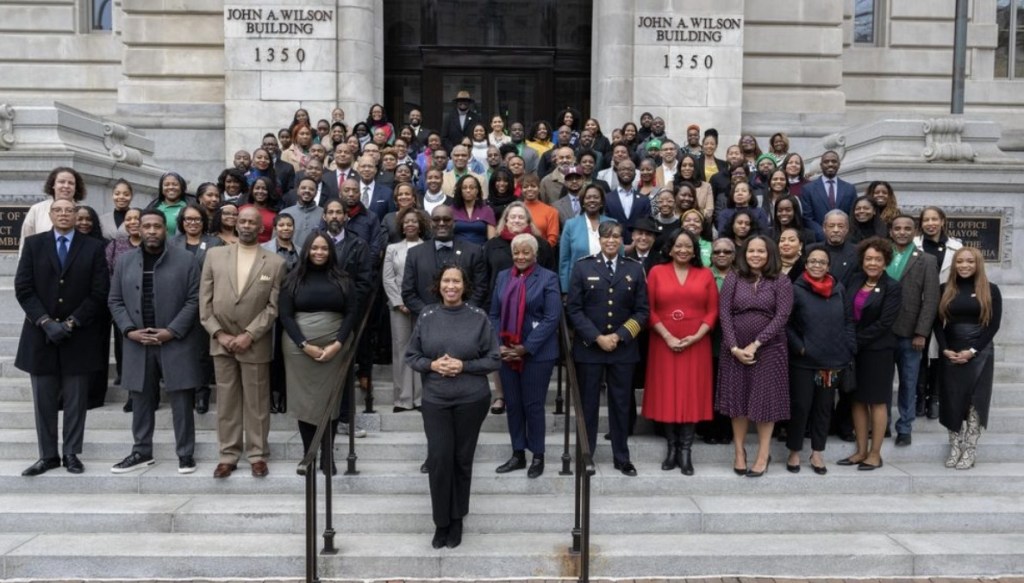By Chrisleen Herard,
Special to the AFRO
By the end of 2023, the District of Columbia had seen 274 reported homicides—the most homicides recorded in 26 years—while being flooded by a wave of carjackings, armed robberies and other violent crimes.
This prompted Councilmember Brooke Pinto (D-Ward 2) to introduce the Secure D.C. Omnibus crime bill, a melting pot of 12 bills that was created by Mayor Muriel Bowser and other D.C. leaders in an attempt to fight back crime that has unleashed havoc and taken loved ones from residents throughout the District.
“Every day, I hear from residents across all eight wards about the urgent need to address crime in our neighborhoods. My Secure DC Omnibus is our opportunity to turn the tide on the crime trends that have overwhelmed our communities,” Pinto released in a statement. “It is resoundingly clear—from residents across the District, businesses, visitors, and our federal and regional partners—that urgent and effective action is needed now.”
Nonetheless, while the D.C. Council meeting took place on Feb. 6, words of protest filled the room as residents, wearing black shirts with bold, white letters that read “Don’t Throw D.C. Under Crimnibus,” sat to listen in.
The omnibus bill was introduced to address prevention, coordination and accountability.
Prevention
To prevent and put an end to the cycles of violence, the bill would establish a grant program for commercial spaces to use funds to buy more safety-enhancing measures and a pilot program for transit stations to buy more technology and cameras. A hospitality career training program, along with a higher nutrition standard, would be offered in D.C. jails.
Another way to avert violence derived from Mayor Bowser’s Addressing Crime Trends Now Act (A.C.T Now), mirrors a 1990 policy created during the crack epidemic that allowed for officers to invoke ‘drug-free zones.’ In other words, police could declare an area, known to be a hotspot for illicit drug activity, as an illegal zone to gather “for the purpose of participating in the use, purchase, or sale of illegal drugs.”
The fear of this, however, is that these zones may enable authorities to act unconstitutionally, ignore the help of those addicted to drugs and disproportionately affect Black and Brown neighborhoods in comparison to their white counterparts.
“We deserve to be safe from crime and from abuse of power,” The American City Liberty Union (ACLU) of D.C.’s policy counsel Melissa Wasser said in a statement. “Allowing officers to escape accountability and to harass people in designated zones will not make D.C. safer. Locking more people up before they are found guilty will not make D.C. safer. These types of provisions in the Secure D.C. Act are not ‘public safety’ solutions, they are measures that open the door for abuse of power.”
“Failed and ineffective ‘drug-free’ zones do little to prevent crime,” Wasser stated. “Instead, they open the door for police officers to harass people and violate our rights.”
Coordination
Under coordination, the bill requires more transparency from the D.C. government, including the Office of Unified Communications releasing data on the 911 call center and the Criminal Justice Coordinating Council sharing the results of diversion programs.
The bill then provides more leeway to D.C. police. Officers could view body-cam footage during pending cases, except if the officers themselves are accused of using excessive force or murdering someone without probable cause. They can also choose whether to withhold disclosing to an individual that they’re being recorded by a body-worn camera.
Additionally, it grants police permission to use neck restraints to limit movement and to pursue suspects in a vehicular chase in the event that they pose a threat to public safety.
Accountability
Accountability under the crime bill alters the definitions and penalties for certain violent crimes, carjackings and theft. It creates a new felony offense for “endangerment with a firearm and unlawful discarding of firearms and ammunition,” and lowers the price threshold for retail theft, making it a felony to take $500 worth of merchandise as opposed to $1,000.
The definition of carjacking would be expanded so more cases could be prosecuted. An individual being forcibly removed from their vehicle would no longer be the only circumstance to fall under carjacking. If car keys are taken forcibly or by threat, this could be considered a carjacking violation as well.
Strangulation would be considered a felony and penalties would be raised for hate crimes and crimes committed within the vicinity of a recreational center. The bill would also allow for pretrial detention for both juveniles and adults who are accused of committing violent crimes.
“Secure D.C. leans heavily on punishment, but that alone won’t be enough,” Councilmember Janeese Lewis George (D- Ward 4), wrote on ‘X.’ “Ending cycles of violence also requires rehabilitation.”
“There are few things as dangerous as giving the public a false sense of safety and this bill pretends to move us forward while we are actually standing still,” Patrice Sulton, executive director of D.C. Justice Lab, told the AFRO. “As the guns get bigger and the opportunities get smaller, violence will continue to grow. We have to start focusing on serving people’s unmet needs, investing copious amounts of resources into violence prevention and building a more coordinated effort across communities.”
Amendments
Although the Secure D.C. bill passed the D.C. Council’s first round of voting, it did not do so without the alterations and removals of some proposals that received disapproval from many D.C. residents.
One of these alterations was made in an anti-mask provision. Councilmembers removed the language that stated it would be illegal to wear a face covering that “causes another person to fear for his or her personal safety.”
In this case, residents feared that someone who was exercising their cultural and religious right to wear a hijab, their health right to wear a non-surgical mask to avoid sickness or their fashion right to wear bandanas or hoodies would be subject to detention, arrest or discrimination.
Another amendment was made regarding granting authorities the right to gather DNA evidence from a suspect upon arrest. This could be seen as unjust, however, as all persons have a right to their privacy, including DNA, unless a serious, violent crime has been committed or a judge grants a warrant or judicial order.
Debunked
One portion of the omnibus bill under the ‘drug-free zones’ provision made its way around social media, claiming that it would criminalize the gatherings of two or more people and allow officers to arrest individuals who refused to leave. However, this can only be the case once a drug-free zone is established. Officers would only be given the authority to ask groups of two or more to leave the premises if they have reason to believe they are gathering to commit a drug crime based on visual evidence or known gang affiliations and convictions. If they do not disperse, however, they are subject to arrest.
This excludes those who are gathering within the zone with no intention of committing a drug crime, but may be in the area seeking medical treatment or waiting for the bus.
Nonetheless, some D.C. residents stand beside their unease that the zones, and other parts of the crime bill, will open them up to more police abuse and harassment, rather than combating the root of the District’s crime issue.
But Mayor Bowser, who will sign off on the bill if it gets approved in the second round of voting in the coming weeks, continues to show support for Pinto and is confident that the Secure D.C. crime bill is what’s necessary to help tame the tide of criminal activity in the District.
“We know that driving down crime requires us to send a clear message that if you make our city less safe, if you bring violence to our community, you will be held accountable,” Mayor Bowser said in a statement, shortly after Pinto introduced the bill. “In 2023, we saw pieces of this legislation move our city in the right direction. Now we can make those provisions permanent and focus on strategies and policies that will continue to make our city safer. I look forward to signing this bill into law and urge the Council to move with urgency to unanimously pass this legislation.”
The post Secure D.C. Omnibus crime bill raises tension with residents appeared first on AFRO American Newspapers.











